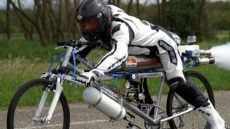In a first, an international team of researchers has found that under certain conditions, our eye can sense “invisible” infra-red light.
Using cells from the retinas of mice and people and powerful lasers that emit pulses of infra-red light, the team found that when laser light pulses rapidly, light-sensing cells in the retina sometimes get a double hit of infrared energy.
When that happens, the eye is able to detect light that falls outside the visible spectrum.
“We are now trying to develop a new tool that would allow physicians to not only examine the eye but also to stimulate specific parts of the retina to determine whether it is functioning properly,” said senior investigator Vladimir J. Kefalov, associate professor at Washington University's School of Medicine in St. Louis.
The research was initiated after scientists reported seeing occasional flashes of green light while working with an infra-red laser.
“We were able to see the laser light which was outside of the normal visible range,” said Frans Vinberg, one of the study's lead authors.
The team experimented with laser pulses of different durations that delivered the same total number of photons.
They found that the shorter the pulse, the more likely it was a person could see it.
By shining a pulsing, infrared laser into the eye, doctors might be able to stimulate parts of the retina to learn more about its structure and function in healthy eyes and in people with retinal diseases.
The findings were published in the journal Proceedings of the National Academy of Sciences (PNAS).





